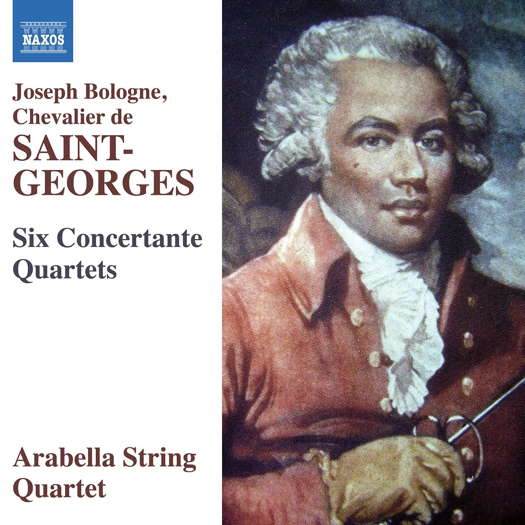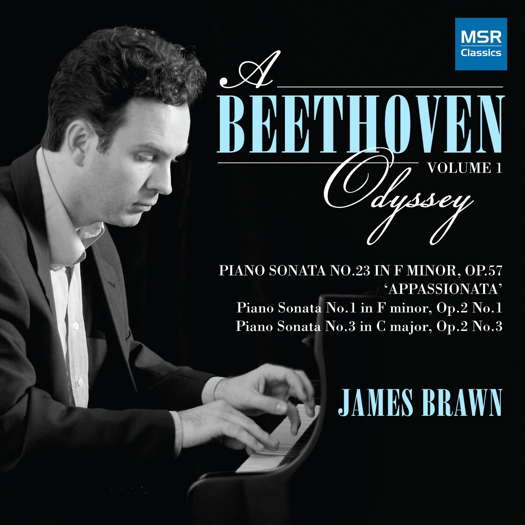 SPONSORED: Ensemble. A view from the pit - John Joubert's Jane Eyre, praised by Alice McVeigh.
SPONSORED: Ensemble. A view from the pit - John Joubert's Jane Eyre, praised by Alice McVeigh.
All sponsored features >>

Exceptionally Pleasing
String quartets by Joseph Bologne, Chevalier de Saint-Georges, heard by GERALD FENECH
'The Arabella Quartet despatches these graceful cameos with aplomb, and the playing is immensely cohesive and consistently alive.'
Joseph Bologne, Chevalier de Saint-Georges (1745-1799), was born in Guadalupe, the son of a former councillor in the Parliament at Metz and a reputedly beautiful slave of Senegalese origin. Around 1749 the Bologne family returned to France and settled in Paris. Of his musical education we know very little, but he might well lay claim to being the most talented figure in an age of remarkable individuals. He was also a brilliant swordsman, athlete, violin virtuoso and gifted composer.
By the standards of the time Saint-Georges was not a prolific composer, but this is hardly surprising given the exceptional range of his activities. The majority of his instrumental works were written between circa 1771 and 1779 and issued in printed editions by leading Parisian publishers such as Leduc and Bailleux during the same period. Saint-Georges' oeuvre is unsurprisingly dominated by the violin concerto and the symphonie concertante. Of his remaining instrumental works, the string quartet holds pride of place with three sets of six works. With neat but surely unintentional symmetry, these quartets include his first and last published instrumental works - the sets Op 1 (1773) and Op 14 (1785). The quartets on this recording fall midway between these two publications.
When Saint-Georges started composing his first quartets circa 1772, the genre was still in its infancy in France. Although during the previous decade quartets by a number of foreign composers - Haydn foremost among them - had been issued by Parisian publishers, these works did not exercise a great deal of influence on local composers, so Saint-Georges can be considered to have been the catalyst for this particular genre of music to flourish in France. The most notable departure of these quartets is their two-movement structure compared to Haydn's four, and in general Saint-Georges' 1777 set show only a fleeting similarity to those by Haydn. Although these works are small in scale, they are not without a certain resourcefulness in terms of texture. True, they lack in virtuosity, but they are wholly in keeping with the more intimate nature of the genre and its function as music to be played rather than music to be listened to by a public audience.
Listen — Joseph Bologne: Allegro assai (Concertante Quartet No 1 in B flat)
(8.574360 track 1, 0:00-0:50) ℗ 2022 Naxos Rights (Europe) Ltd :
The description of the works as 'Quartetto concertans' reflects the independence of the four instruments in the presentation of thematic material. This emphasis on solo writing demands a corresponding simplification of musical textures, and thus the quartets contain little in the way of thematically conceived part writing, and there is a marked stylistic dichotomy between melodic and accompaniment functions.
As is the penchant with all composers, no matter the times in which they lived, experimentation was part of the job. Saint-Georges is no exception in this regard, and his extensive soloistic use of the lowest part in these pieces proves categorically that it was conceived for the cello. As some of the part-crossings could have been easily avoided, it seems that the composer included them in order to explore different timbres in the ensemble.
Listen — Joseph Bologne: Aria andantino (Concertante Quartet No 2 in G minor)
(8.574360 track 4, 1:32-2:19) ℗ 2022 Naxos Rights (Europe) Ltd :
Although these quartets are small in scale and are hardly ambitious in terms of their musical structures, they are exceptionally pleasing, and contain numerous instances of the composer's rich lyrical gifts and his sensitivity to the ensemble's possibilities of combining four instruments into one whole.
Listen — Joseph Bologne: Gratioso (Concertante Quartet No 5 in G)
(8.574360 track 10, 0:00-0:32) ℗ 2022 Naxos Rights (Europe) Ltd :
As one can surmise, these scores do not make the heart pound, but the music is refreshingly light, exquisitely melodic and harmonically forward-looking. The great string quartets of the nineteenth century owe their development not only to Haydn and Mozart but also to Saint-Georges, albeit to a lesser extent.
Listen — Joseph Bologne: Allegro (Concertante Quartet No 6 in B flat)
(8.574360 track 11, 5:44-6:43) ℗ 2022 Naxos Rights (Europe) Ltd :
The Arabella Quartet despatches these graceful cameos with aplomb, and the playing is immensely cohesive and consistently alive. Indeed, in their hands the music sounds structurally more substantial than it really is. This is not in the league of a Beethoven or a Brahms, but highly delightful chamber music that deserves to be more exposed. Sound and annotations are top-notch.
Copyright © 2 June 2022
Gerald Fenech,
Gzira, Malta

CD INFORMATION - SAINT-GEORGES: SIX CONCERTANTE QUARTETS
JOSEPH BOLOGNE - CHEVALIER DE SAINT-GEORGES



